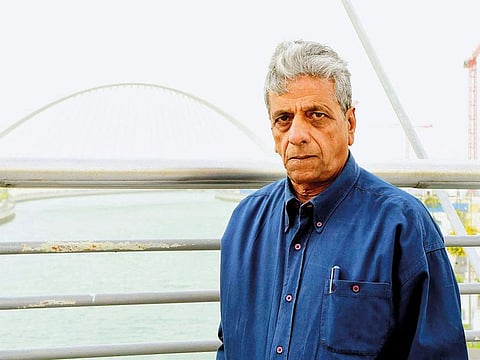‘Hello Bombay, could you please connect me to Karachi’
After four decades on the job in Dubai, phone lineman shares memories of bygone era

Dubai: In the early 80s, if you wanted to make a phone call from Dubai to Karachi, Pakistan, you would first have to speak to an operator in Bombay, India, to connect you.
A lot has changed since then in Dubai’s telecom sector, to say the least, and one expat has seen the incredible transformation very closely.
Pakistani national Qazi Mohammad Turrab, who retired a few days ago, joined Etisalat in 1977 as a lineman — just a year after the company was founded.
During his four decades of service, Turrab has connected and repaired “hundreds of thousands” of landlines in Dubai.
Wooden telephone poles
Dubai was a very different place in the 70s, said Turrab, now 62. There were no glitzy malls or mobile phone towers. Telephone lines ran overhead on wooden poles and underground as well, he recalled during an interview with Gulf News this week. There used to be a Dubai State Telephone Company that became Emi Tel, which became Etisalat.
In the late 70s, when Turrab arrived in Dubai from his native Lahore city in Pakistan, there were only around 70,000 to 80,000 numbers in service, which were only four digits long, compared to seven digits today.
Nowadays, it is easy to get a mobile phone SIM card on arrival at the airport. Back in those days, new arrivals had to wait a month or so to get a landline installed at their residence.
Three-month ‘grace’ period
“It all depended on which area you lived in, where was the nearest local exchange, the access to a Distribution Point, availability of the lineman, and so on … Many customers paid their bills after three months without getting disconnected. It was kind of normal,” Turrab, who has eight children, said.
There was no smartphone app to pay your bill — there were no mobile phones — and bills came in the post mail.
“There used to be just one business centre, where customers could apply for a phone connection and pay their bills, in a building that was next to the Dubai Municipality headquarters on the Creek,” Turrab says.
“And before local exchanges came up, there was one central exchange from where all the phone lines went out in Deira. It was located near where the main Etisalat office building is now.”
Phone locks
Telephone sets were different too and, needless to say, customers valued their rotary dial phones, having waited a while to get them connected.
“At first there was no STD (subscriber trunk dialling), or direct international dialling without an operator. Then people who had “double-zero activated” to make international calls, some of them would put a tiny lock on the dial so no one else could turn the dial all the way to zero without their permission at home or office,” Turrab said.
Late night call
As a lineman, Turrab said one of his most memorable assignments was a late night job at the palace of the then ruler of Dubai, the late Shaikh Rashid Bin Saeed Al Maktoum.
“Some lines at the palace were not working and I went with a team really late at night to see what the issue was. It was a loose connection issue and we fixed it.”
Turrab said: “As linemen, we were the face of the company and were expected to maintain the highest standards for our customers. If we went to a customer’s residence to install or repair a line, we would only ring the doorbell once. We would wait 10 minutes before leaving if there was no answer at the door. There were no mobile phone or pagers to let customers know we’re coming.”
Now that he is retired, Turrab plans to work for himself as a businessman providing technical and telecom services.
“I want to stay on in the UAE, this country has given me so much. All my eight children were born and raised here. I have deep gratitude for the UAE and its people.”



